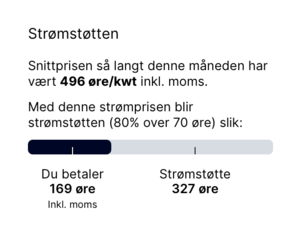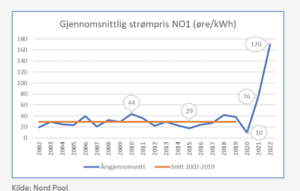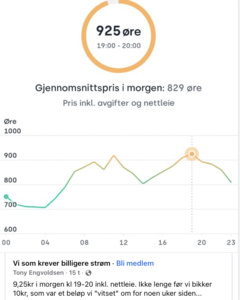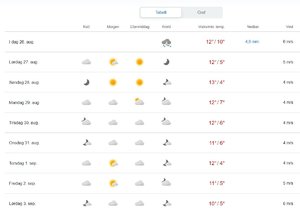Charlie Stross om "stoda" i Storbritannia. Nicola Sturgeon vurderer å nasjonalisere energisektoren i Skottland.
Vi har ikke sett begynnelsen på endringene som vil komme i "markedet" denne vinteren.
This is about the gathering crisis in the UK, not any other crisis-hit nation.
Here is a compendium of the firehose of dismay that's been blasting me in the face for the past couple of weeks. Share and enjoy! And feel free to use the comment thread to discuss what's coming next for the UK as the vector sum of Brexit, COVID19, the energy crisis from the Ukraine war, and the worst inflationary bubble since 1980 punches us in the face.
First, Europe is in the grip of
the worst drought in 500 years.
England is officially in drought too, and the
potato, onion, and carrot crops are all expected to fail, with potato yields in particular down 50%. (Before we mention
Brexit crippling exports of Scottish seed potatoes to the EU.)
Boris Johnson is still Prime Minister for a couple more weeks, but is treating his remaining time in office—since his resignation was announced—as garden leave: he's been holidaying in Greece. However, he refused to hand over the reins to Deputy PM Dominic Raab in the meantime. The rash of ministerial resignations that led to Johnson's resignation has left a number of portfolios vacant, with no successors appointed.
In effect, Johnson's executive team downed tools and walked out, leaving the building empty. In consequence, government business is being blocked or ignored, as the worst crisis in 50 years bears down on the nation.
Inflation is skyrocketing, with
Citi forecasting it will hit 18.6% in January, largely due to the energy crisis resulting from the Ukraine war feeding through the system to hit domestic and business consumers.
(It's not just Citi; the Bank of England are forecasting 13% inflation towards the end of the year.)
This is probably going to lead to a
Sterling crisis, which won't help—Sterling is currently close to its ten year low against the US Dollar (it's only been lower in mid-March 2020, when the UK abruptly slammed into lockdown).
Small businesses are already folding as their energy contracts raise prices by 400-1000% for the next year: there are worries about care homes being unable to keep their residents warm. 8% of businesses already report that price increases to date threaten their viability, but worse is to come.
There is a forecast risk of unscheduled, protracted, rolling black-outs in midwinter.
The government's own forecasts of a "reasonable worst case" (which include some scheduled blackouts) still rely on the UK importing electricity via the grid interconnectors from France, the Netherlands, and Belgium—but those nations are having their own energy problems.
Nicola Sturgeon, First Minister of the SNP government in Scotland, has proposed the unthinkable, that nationalising the energy sector should be back on the table, after it was reported that 36% of Scottish households would be in fuel poverty by October. But Truss isn't listening to her (see below).
Brexit hasn't delivered trade opportunities, but mountains of red tape, with a hit to the economy estimated at roughly 6% so far. But
the UK economy already shrank 11% in 2020, the worst year since 1709.
Brexit
has delivered some deregulation, though: notably, the Conservative government ditched EU standards on effluent discharges, resulting in the (private)
water companies discharging raw sewage into almost every river, and the seas around the UK coastline.
So it is no longer safe to swim in UK waters.
In part this is due to difficulties in importing chemicals required for water purification plants from the EU ... but that's also a Brexit side-effect.
The English NHS is officially hitting it's regular annual "winter crisis" (with
hospitals unable to take new patients, and A&E units logjammed with emergency cases) in August.
There's a staffing crisis, with armed police units (normally backstops for regular cops on patrol, called in only during violent incidents) being
sent to heart attack patients because there are either no paramedics, or the ambulances are all full and queuing at the logjammed A&E units.
With inflation already nudging 10% it should be no surprise that workers are asking for pay rises. The railway network is being hit by 24 hour strikes, with widespread public support for the actual workers—it seems
some employees are better rewarded than others. That's's not an isolated example:
Average pay for FTSE100 executives jumped by 39% to £3.4M from 2020-21.
Meanwhile here in Edinburgh—in the middle of the biggest arts festival in Europe—
the bin workers have started a two week strike, after a Labour-led coalition with the Conservatives on the city council rejected a request for a 5% pay rise and offered 2% instead.
(It's a boomtown for rats right now!)
Actually,
everyone seems to be striking.
The criminal bar has just walked out, demanding a 25% pay increase after a decade of actual cuts to their remuneration for representing criminal defendants in court. But don't worry about being put on trial,
criminal cases take an average of 708 days to come to court at present, And that's if you're arrested in the first place—police numbers are down 15% since 2010, and service budgets have been cut by at least 20-25%.
Dock workers at Felixstowe, the UK's biggest container port, are striking for the first time in 30 years.
Public transport in London is being hit by strike action.
There is even a
whiff of General Strike in the air.














